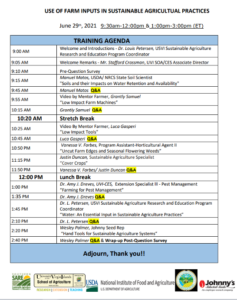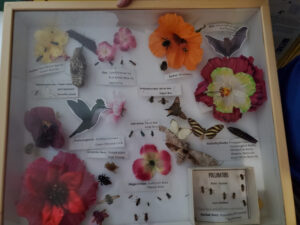Final report for SVI20-001
Project Information
The membership of the U.S. Virgin Islands SARE Advisory Council proposed three priority areas in which training is needed in order to advance agricultural sustainability in the territory. The professional development activities described in this proposal for the 2020 – 2021 implementation period are designed to meet the needs of all stakeholders while building upon the successes achieved during previous years. The specific areas of need include training on Farm Record Keeping; the Safety, Health, and Wellness of Farmers; and Cost Share Opportunities and Sustainable Agricultural Practices.
During the 2018 – 2019 implementation period areas of priority included pollinator identification and population management, food safety training, and the cooperative business model. During the 2019 – 2020 period the training objectives focused on continued food safety training, the principles of organic farming, and the sourcing/use of farm inputs for use in sustainable agricultural practices.
The proposed training on Record Keeping for the up-coming 2020 – 2021 cycle will build upon previous educational efforts such as education on the cooperative business model to improve the economic practicality of producers. Also, the previous training events on food safety were designed to sustain the economic viability of producers while protecting consumer health. Finally, the suggested training on Cost Sharing Opportunities for Sustainable Agricultural Practices is designed to increase awareness of a cost saving opportunity for producers while encouraging the implementation of sustainable production practices. The target audience for all training events will be outreach staff from all state and federal agencies and mentor farmers.
The target audience for the USVI Professional Development Program for the 2020 – 2021 implementation period will be mentor farmers and outreach agricultural staff from state and federal agencies.
Objective 1. To increase knowledge and awareness to improve financial management and record keeping skills
Objective 2. To increase knowledge, awareness as well as management, prevention, and coping skills regarding Safety, Health, and Wellness of farmers
Objective 3. To increase knowledge and awareness about cost share funding opportunities for the implementation of sustainable agricultural practices
Advisors
- (Researcher)
Education
To achieve the best result and to demonstrate in a, learn by doing method to achieve out training goals, the train the trainer approach was utilized. Due to the COVID situation that plagued us for some time, most of our presentations were done virtually. However we emphasized that all of the methods being discussed in the presentation were being implemented. In addition, wherever possible, a hands-on approach to learning was used, which meant we tried to be as creative a possible. Extension staff, researchers, USDA personnel and mentor farmers participated in all the educational projects. The activities focused on increasing knowledge and practical application regarding Principles and Practices of Organic Farming, Sourcing and use of Farm Inputs in Sustainable Agricultural Practices, and Pollinator Identification & Population Management in the VI (i.e. St. Croix and St. Thomas/St. John). During the educational sessions, the trainers emphasized the utilization of resources that were easily available.
Education & Outreach Initiatives
To create a greater awareness of some of what is involved in Organic Farming as well as what Biological Soil Amendments are how can be used and used safely.
A two-day webinar on Organic Farming & Biological Soil Amendments, was conducted on April 12-13, 2021. The participants were farmers, agricultural outreach staff and other persons interested in learning about the National Organic Standards, the Produce Safety Rule, and the latest research-based information regarding the proper management and use of materials, such as animal manures. Presenters included Mr. Brennan Washington, the Southern SARE Outreach Coordinator and personnel from the Food and Drug Administration.
ORGANIC FARMING AND BIOLOGICAL SOIL AMENDMENTS TRAINING AGENDA
April 12 – 13, 2021
9:30AM-12:00PM-1:00-3:00PM AST Each day
|
April 12th (AST) |
Day 1 |
|
9:30 AM ET |
Welcome and Introductions - Dr. L. Petersen
Pre-test |
|
10:00 AM ET |
“Introduction to Organic Farming” Mr. Brennan Washington |
|
10:30 AM ET |
Stretch Break |
|
10:35 PM ET |
“Introduction to Organic Farming “Mr. Brennan Washington |
|
12:00 PM ET |
Lunch Break |
|
1:00 PM ET |
Introduction to The Produce Safety Rule Mr. Trevor Gilbert FDA |
|
1:10 PM ET |
“Overview of Produce Safety Rule (Subpart F) -Biological Soil Amendments of Animal Origin” Dr. D. Ingram |
|
2:00 PM ET |
Stretch Break |
|
2:10 PM ET |
“Overview of Produce Safety Rule (Subpart F) -Biological Soil Amendments of Animal Origin” Dr. D. Ingram |
|
2:50 |
Question and Answer Segment |
|
|
|
|
April13 th (AST) |
Day 2 |
|
9:30 AM ET |
Welcome and Introductions - Dr. L. Petersen
Pre-test |
|
10:00 AM ET |
“Introduction to Organic Farming” Mr. Brennan Washington |
|
10:30 AM ET |
Stretch Break |
|
10:35 PM ET |
“Introduction to Organic Farming “Mr. Brennan Washington |
|
12:00 PM ET |
Lunch Break |
|
1:00 PM ET |
Introduction to The Produce Safety Rule Mr. Trevor Gilbert FDA |
|
1:10 PM ET |
“Overview of Produce Safety Rule (Subpart F) -Biological Soil Amendments of Animal Origin” Dr. D. Ingram |
|
2:00 PM ET |
Stretch Break |
|
2:10 PM ET |
“Overview of Produce Safety Rule (Subpart F) -Biological Soil Amendments of Animal Origin” Dr. D. Ingram |
|
2:50 |
Question and Answer Segment |
|
|
|
More local farmers are requesting information on and ordering organic inputs to use on the crops they are growing.
With regards to the Biological Soil Amendments, this is something that has been used by many local farmer for growing their crops. However many more a now aware that there is a right and a wrong way to use it for the safety of not only the customer but also for the farmer and their families.
To teach Agricultural professionals how to utilize farm inputs for the Sustainability of Virgin Islands Agriculture
Through a collaboration with the VI Dept. of Agriculture, Johnny’s Selected Seeds and the University of the Virgin Islands, the USVI SARE team conducted a one-day webinar on the Use of Farm Inputs in Sustainable Agricultural Practices. The participants were farmers, agricultural outreach staff and other persons interested in learning about farming in a sustainable manner while getting the job done well. Presenters included Mentor Farmer Grantley Samuel, Mentor Farmer Luca Gasperi, Program Assistant Vanessa Forbes, Sustainable Agricultural Specialist Justin Duncan, Extension Specialist Dr. Amy J. Dreves, Dr. L. Petersen, USVI Agricultural Research and Education Program Coordinator and Wesley Palmer Johnny Seeds Rep.
A follow up field day is needed to allow the farmers and Ag professionals hands on experience.
Many of the persons in attendance were appreciative, in learning of the tools and techniques that can make their farms and farming practices more sustainable.
Additional work is needed with this to measure the impact from this initiative as well as see who adapted these initiatives
Bring additional awareness to participants of the importance and benefits of record keeping on farms
Two days of training were done in Farm Record keeping and Accounting. These classes were taught by Dr. Amy J. Dreves, Extension Specialist lll-Pest Management and Dr. Olubukola Ehinmowo Assistant Professor of Agribusiness/Economics.
Day 1:
May 11, 2023
Farm Records and Accounting
Dr. Olubukola Ehinmowo
Assistant Professor of Agribusiness/Economics
Dr. Amy J. Dreves
Extension Specialist III- Pest Management; Associate Professor
Participants in this training were farmers, Ag professionals and interested people from the community. Lessons taught how records tell the farm manager where the business has been and whether it’s on the path to making profits and creating financial stability.
Records are the manager’s report card because they show the results of management decisions over the past period. Measure profit and assess financial condition. Provide data for business analysis as well as assist in obtaining credit.
Day 2:
May 11, 2023
Farm Records and Accounting
Dr. Olubukola Ehinmowo
Assistant Professor of Agribusiness/Economics
Dr. Amy J. Dreves
Extension Specialist III- Pest Management; Associate Professor
Records for monitoring plants for weekly problems (pests, disease, nutrition, abiotic factors, etc.)
Observations, evaluating new tool effectiveness, weather patterns affecting pest build-up records for pesticide inventory, pesticide use, trainings.
18 Persons in attendance on both days.
Slides 5_E FINAL FARM MGT & PLANNING May 11 2023oluokula_dreves
The above slides were used for the training and presented to the persons that requested them
Additional work is needed with this to measure the impact from this initiative as well as see who adapted these initiatives
To make participants aware that noise levels can be harmful if proper protection is not utilized
St. Croix Agricultural Food Fair 2022 we initiated the first leg of the Prevention and coping series. An interactive game was created to test the knowledge of the fairgoers to see how much they knew about hearing protection and what noise level it took to do damage to their hearing. Using https://nasdonline.org/7365/d002550/have-you-heard-hearing-loss-caused-by-farm.html,
https://www.kcdhh.ky.gov/ois/factsheets/AgricultureHearingLoss.pdf,
and information provided by AgriSafe along with images found online of farms as well as day to day tractors, leaf blowers, chainsaws, electric drills, pigs squealing.
We tested what people thought was safe and informed them of does and don’t when it comes to proper hearing protection. This was also done using hand out and visual aids consisting of several different levels of hearing protection. This allowed participants to realize that all hearing protection is not created equally.
Additional work is needed with this to measure the impact from this initiative
To continue to bring a greater awareness of the importance of what animals and insects are pollinators. As well as how we can aid them with habitat development as well as by being more intentionally aware of what we plant in our farms and gardens and how it benefits the pollinators and humans.
Pollinator Identification and Population Assistance has been ongoing for several years. Was started at the 2020 Agricultural Food Fair. Pollinator condos were constructed as a display centerpiece and a range of flowers known to be beneficial to pollinators were planted to educate, decorate, and enhance the ideas that we wanted to deliver to the fair attendees. An informational poster was placed on the back side of the large pollinator condos and each of the pollinator plants and flowers were labeled to provide easy to read information. At the end of the 2020 Agricultural Food Fair most of the pollinator condos were donated to local farmers. The plants and flowers were given to farmers and fair participants to plant and encourage further growth of the flowers in the territory.
hand out was given out
All the flowers grown for the display were given away to participants
11 Pollinator condos were given out to farms and home owners
Educational & Outreach Activities
Participation Summary:
Learning Outcomes
Face of SARE
SARE VI Grant recipients (Program Assistant (PA) Vanessa Forbes) utilizes SARE publications in on farm visits, presentations and discussions whenever possible to highlight the many journeys through which farms and farming have come. Publications such as Managing Weeds on Your Farm, Building Soils for Better Crops and Managing Alternative Pollinators, and Organic Transition, are uses to help farmers to see the importance of moving away from conventional ways of farming such as mono-cropping and excessive soil tillage. SARE website and research funded by SARE are also used as teaching tools

